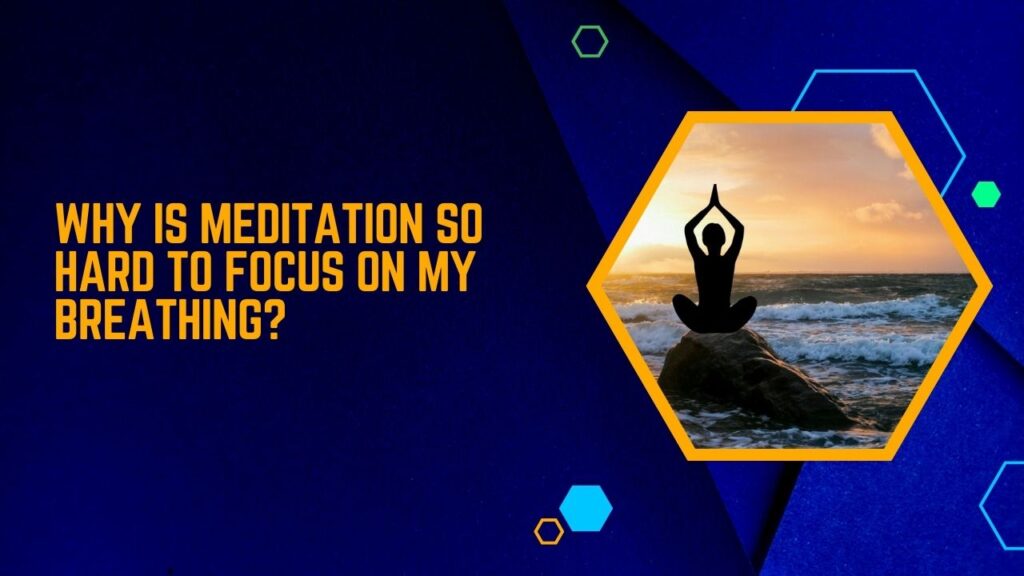Why Is Meditation So Hard To Focus On My Breathing? Meditation can be hard because the mind naturally wanders, making it difficult to maintain focus on breathing.
Meditation is often celebrated as one of the simplest yet most effective practices for achieving mental clarity, stress relief, and emotional balance.
People turn to meditation for various reasons, such as reducing anxiety, gaining better focus, or simply taking a break from the demands of everyday life. Among the numerous meditation techniques, focusing on the breath is one of the most common and foundational practices.
However, for many, one of the greatest challenges in meditation is the difficulty of focusing on breathing.
This challenge often leaves beginners frustrated and wondering if they’re doing it right. If you’ve ever found it hard to focus on your breath during meditation, you’re not alone.
Understanding the reasons behind this difficulty can help you overcome it and ultimately lead to a more rewarding meditation experience.
What Is Meditation?
At its core, meditation is a practice that helps individuals achieve a state of mental calmness, clarity, and heightened awareness. [Why Is Meditation So Hard To Focus On My Breathing?]
It involves training the mind to focus and quieten, often through focusing on a single point of attention, such as the breath, body sensations, or a mantra.
The purpose of meditation is not to “empty” the mind completely, but to foster an awareness that allows you to observe your thoughts without attachment or judgment.
There are several types of meditation practices, including mindfulness, loving-kindness, body scan, and concentration meditation.
While each technique serves a different purpose, they all aim to help individuals develop a greater sense of awareness and presence in the moment.
The most common form of meditation involves focusing on breathing. Breathing is a powerful tool in meditation because it is always present and accessible, and it is closely tied to our state of relaxation and mindfulness.
Despite its importance and simplicity, focusing on breathing can prove difficult, especially for beginners. [Why Is Meditation So Hard To Focus On My Breathing?]
5 Reasons Why It’s Hard to Focus on Breathing During Meditation?
While meditation has numerous benefits, focusing on breathing during meditation can often feel surprisingly difficult.
Here are five reasons why maintaining focus on your breath during meditation can be challenging:
1. Mental Distractions
One of the most significant obstacles when trying to focus on the breath is the constant flow of thoughts in the mind. [Why Is Meditation So Hard To Focus On My Breathing?]
The human mind is inherently active, constantly generating thoughts—whether about your day, your work, or things that may be stressing you out.
The more you try to quiet your mind, the more persistent these thoughts seem to become. It’s like trying to listen for a faint sound in a loud room.
As you sit quietly and attempt to focus on your breath, your mind may wander to memories, to-do lists, or worries. This constant mental chatter can make it hard to focus solely on breathing.
2. Restlessness
Another reason it can be hard to focus on breathing during meditation is physical discomfort. When we sit still for an extended period, we often become aware of physical sensations in the body.
Whether it’s an itch, aching muscles, or an uncomfortable sitting posture, these sensations can distract from the breath.
Our bodies are not accustomed to sitting still for long periods, and this restlessness can cause the mind to drift away from the breathing process.
It’s common to feel the need to fidget or adjust your posture, which disrupts the meditative state. [Why Is Meditation So Hard To Focus On My Breathing?]
3. Unrealistic Expectations
Many people approach meditation with the expectation that it will be a perfectly calm and serene experience.
The desire for a flawless meditation session can put undue pressure on the practitioner, making it more difficult to focus.
When you feel like you’re “doing it wrong,” your mind becomes fixated on the idea of perfection rather than simply experiencing the moment.
The more you worry about not being able to focus on your breath, the harder it becomes to actually do so. [Why Is Meditation So Hard To Focus On My Breathing?]
This type of self-judgment often leads to frustration and disappointment, which can create more mental clutter rather than bringing clarity.
4. Stress and Anxiety
One of the reasons meditation can feel difficult is that stress and anxiety often have a firm grip on the mind.
The act of sitting quietly can bring up unresolved emotions, worries, or racing thoughts. When you’re feeling stressed or anxious, it can feel impossible to quiet the mind and focus on something as subtle as breathing.
Instead of finding peace in the stillness, you may become more aware of your anxious thoughts. [Why Is Meditation So Hard To Focus On My Breathing?]
These heightened emotions interfere with your ability to maintain focus, making it even harder to concentrate on your breath.
5. Habit of Multitasking
In today’s fast-paced world, many of us are constantly multitasking. We juggle multiple tasks at once, such as checking emails, responding to text messages, or thinking about what’s next on our agenda.
This habit of switching between tasks trains the brain to always be “on,” and it becomes difficult to sit still and focus on just one thing.
During meditation, when you’re asked to focus on your breath, the brain resists because it’s used to being constantly engaged. [Why Is Meditation So Hard To Focus On My Breathing?]
The habit of multitasking makes it harder to practice single-tasking, which is essential for meditation.
Psychological Factors Behind Distraction in Meditation
The difficulty of focusing on the breath during meditation is not just a result of willpower or lack of discipline. It is deeply rooted in how the brain functions.
One of the key psychological factors at play is the Default Mode Network (DMN). This network of brain regions is active when we’re not focused on an external task and is associated with mind-wandering and self-reflection.
Essentially, when the brain is at rest and not focused on a specific activity, the DMN activates, leading to a stream of random thoughts. [Why Is Meditation So Hard To Focus On My Breathing?]
During meditation, the mind tends to revert to this default mode, causing distractions that make it difficult to maintain attention on the breath.
Overthinking is another psychological factor that contributes to distraction. Meditation encourages you to observe your thoughts, but often, when a thought arises, you may engage with it instead of letting it pass by.
Overanalyzing your thoughts, or wondering if you are “doing it right,” only leads to more mental clutter. Instead of letting go of thoughts, you may get caught up in them, further drifting away from the focus on your breath.
How to Improve Focus on Breathing During Meditation
If you find it hard to focus on your breath during meditation, there are strategies that can help you improve over time:
Gradual Practice
Meditation is a skill that improves with consistent practice. Instead of expecting immediate results, it’s helpful to start with shorter sessions—5 to 10 minutes—and gradually increase the time as you build your ability to focus.
By starting small, you avoid overwhelming your mind and give yourself the opportunity to practice focusing for short intervals before gradually extending your sessions.
Mindfulness of Distractions
When distractions arise, try not to resist or judge them. Instead, observe them as they are and gently return your attention to your breath.
By acknowledging distractions without judgment, you reduce the mental resistance and frustration that can interfere with your focus.
Treating distractions as a natural part of the meditation process makes it easier to maintain attention on your breath.
Use Grounding Techniques
Physical grounding techniques can help anchor your attention to the present moment. Pay attention to the sensations of breathing—feel the rise and fall of your chest or the coolness of the air entering your nostrils.
These sensory experiences help to bring you back into the present moment, making it easier to stay focused on your breath. [Why Is Meditation So Hard To Focus On My Breathing?]
Guided Meditations
For beginners, guided meditations can be a helpful way to stay focused. These sessions provide instructions that keep you on track and offer a structure for your meditation practice.
A guided meditation can help direct your attention to the breath, reducing the likelihood of your mind wandering. Many apps and online resources offer guided meditations for different levels and durations.
Focus on Breathing Patterns
Experiment with different breathing techniques to see which one works best for you. [Why Is Meditation So Hard To Focus On My Breathing?]
Deep belly breathing, for instance, requires more awareness and focus on the movement of the diaphragm, while alternate nostril breathing engages both physical and mental attention.
By incorporating different patterns into your practice, you engage your body more actively, which can help deepen your focus.
See Also: Why Is It So Hard To Twist Off Barbell Earrings?
The Role of Consistency in Meditation Practice
Building the ability to focus on your breath takes time and regular practice. As with any skill, meditation improves with consistency. [Why Is Meditation So Hard To Focus On My Breathing?]
The more you practice, the more your brain learns to focus on one thing at a time. Over time, you’ll notice that it becomes easier to quiet your mind and maintain attention on the breath.
Even if distractions arise, your ability to gently return your focus to your breath will improve, and meditation will become a more natural and fulfilling experience.
FAQs
How long should I meditate to improve focus?
It’s best to start with 5-10 minutes a day and gradually increase the duration as you become more comfortable.
What if I can’t stop thinking during meditation?
It’s normal to have wandering thoughts. Acknowledge them without judgment and gently return your focus to your breath.
Can meditation help reduce anxiety?
Yes, meditation is well-known for reducing stress and anxiety by helping you stay grounded in the present moment.
Is it normal to feel restless while meditating?
Yes, restlessness is common, especially for beginners. Try not to fight it; accept it as part of the process. [Why Is Meditation So Hard To Focus On My Breathing?]
Should I try different types of meditation if I can’t focus on breathing?
Yes, exploring different types of meditation, such as body scan or loving-kindness meditation, can help improve your ability to focus over time.
Conclusion: Why Is Meditation So Hard To Focus On My Breathing?
Meditation is a journey, not a destination. While focusing on your breath may be challenging at first, it’s important to be patient with yourself.
Every moment spent practicing is a step toward greater focus, peace, and mental clarity. [Why Is Meditation So Hard To Focus On My Breathing?]
With time, consistent practice, and the right techniques, you will find that meditation becomes more natural, and focusing on the breath will no longer feel like such a struggle.
Remember, it’s okay if your mind wanders—it’s all part of the process. Keep coming back to the breath, and the benefits of meditation will gradually unfold.

Hi, I’m Fernando Pham, and welcome to WhyDetails.com! I’m from San Francisco, and I love exploring questions and sharing answers through my blog.



